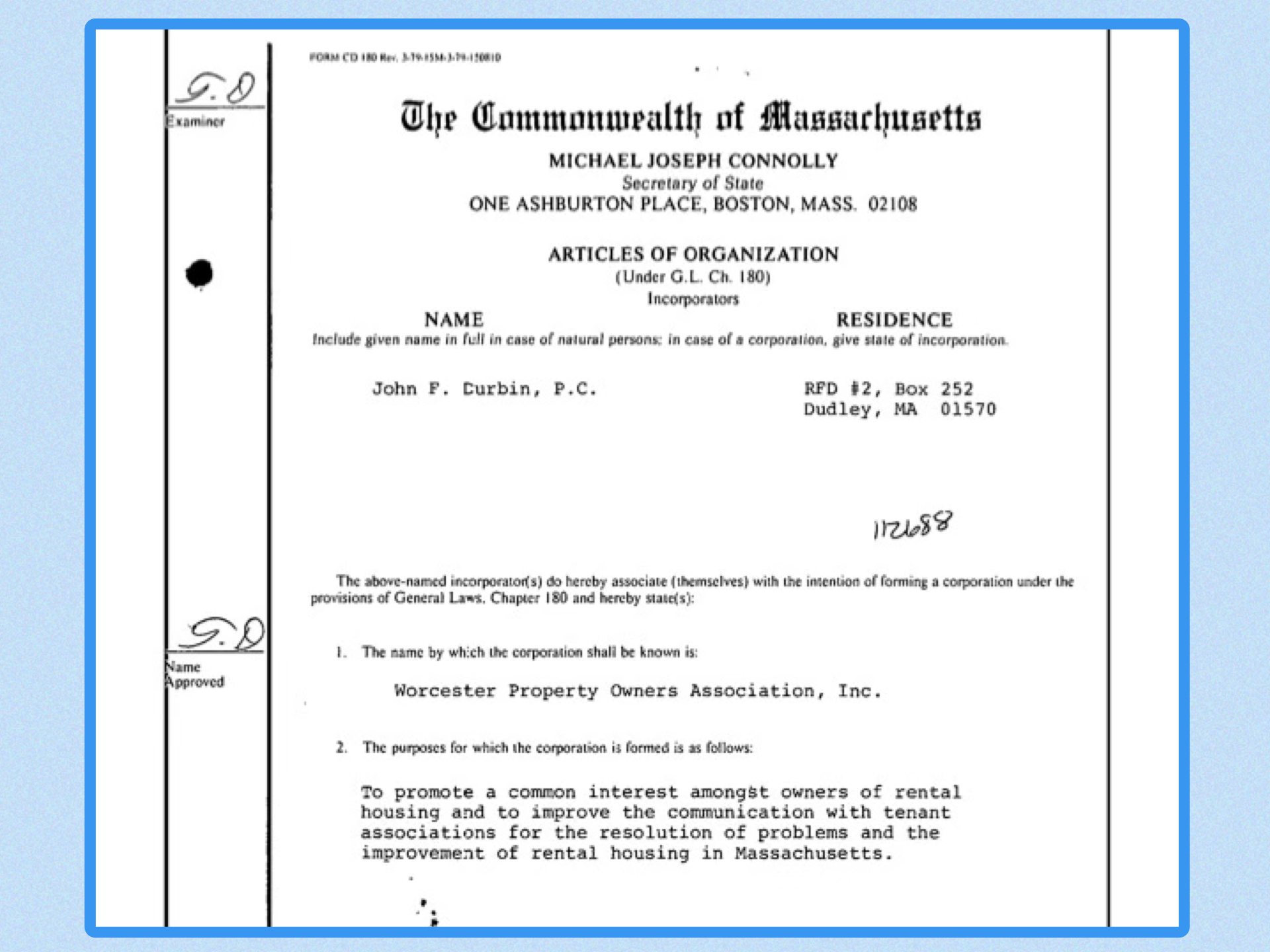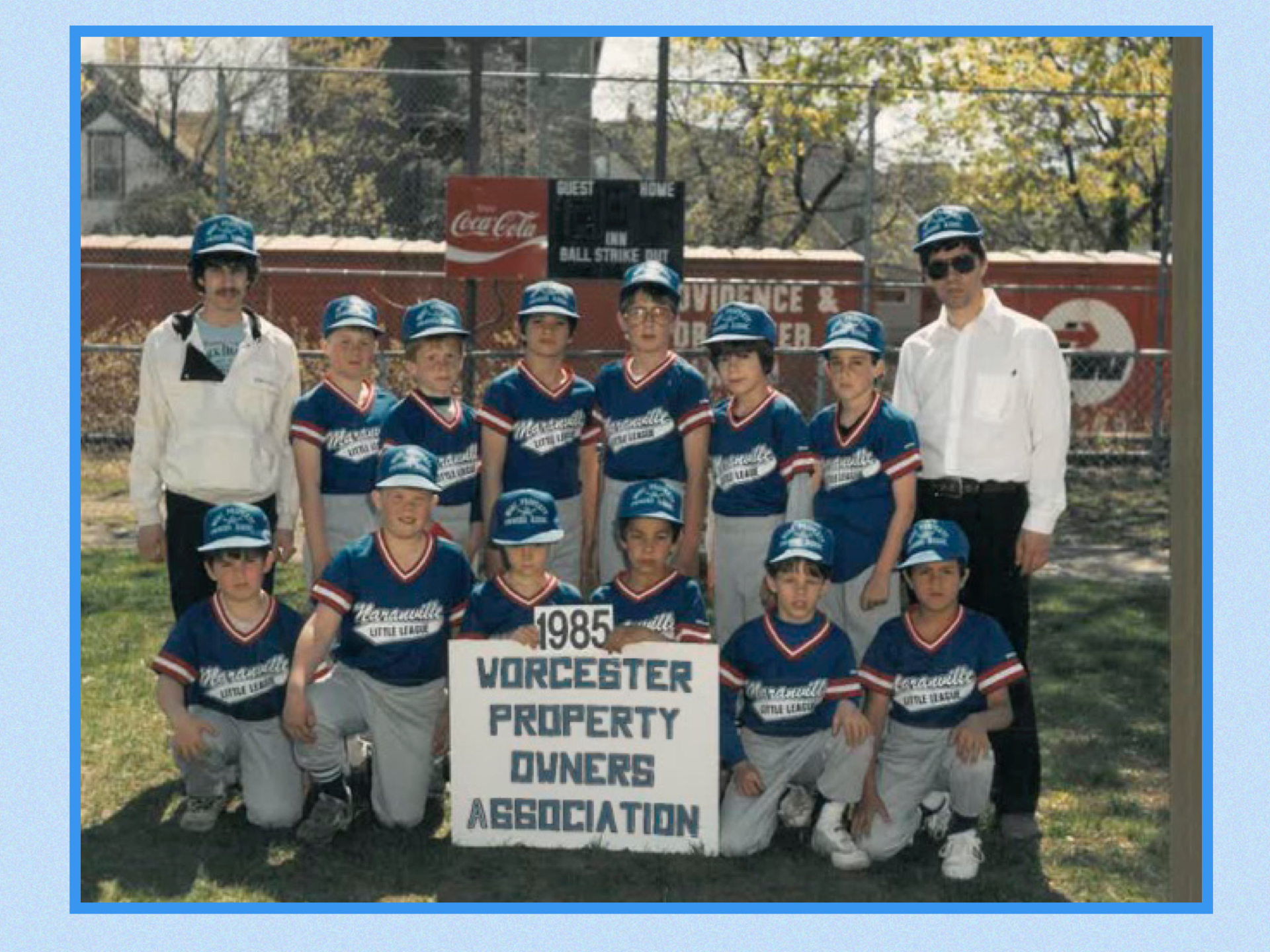From WPOA to MassLandlords: Celebrating 40 Years of Community
. Posted in News - 0 Comments
By Kimberly Rau, MassLandlords, Inc.
This year, MassLandlords celebrates 40 years of community, education and support for rental housing providers across the state. We’ve accomplished a lot since 1985, and we’re proud of where we are today.

The Worcester Property Owners Association was officially incorporated in 1985. (Image: cc BY-SA 4.0 MassLandlords, Inc.)
1985: The Worcester Property Owners Association Is Incorporated
Though MassLandlords, Inc., as we know it today did not come into existence until 2014, it’s the direct descendent (same tax ID) of the Worcester Property Owners Association (WPOA), which filed its articles of incorporation in 1985. At the time, WPOA was one of 20 regional landlord groups operating throughout Massachusetts. Some of them were very large and well-organized. Others were more like clubs. The Massachusetts Rental Housing Association (MRHA) and the Small Property Owners Association (SPOA) were two of several statewide groups. Largely focused on fighting rent control, both groups worked tirelessly and are responsible for the policy’s 1994 defeat.
Other groups, including the WPOA, Southern Worcester County Landlord Association (SWCLA) and Northern Worcester County Landlord Association (NWCLA), were more local. The smaller groups had an operating budget of around $10,000 a year.
In 2011, when MassLandlords Executive Director Doug Quattrochi began volunteering with the WPOA, landlords often did not have a seat at the table when policy was being determined at state or local levels. There wasn’t a lot of unity, and not a lot of money left over for advocacy.
The next step seemed clear. If the groups came together under a direct-management model, there would be power in numbers, and an annual operating budget of around $200,000. SPOA and SWCLA were two of our biggest, and earliest, supporters. Many of the other groups also saw the appeal of centralizing, and in 2014, the MassLandlords website launched, along with a “digital only” membership. The name was designed to appeal to landlords statewide, and it worked. We officially changed our name to MassLandlords on tax documents in 2016 (the website and the d/b/a launched early 2014).
The transition has not always been without hardship. In-fighting at SPOA caused us to part ways with the group in 2017. Covid-19 forced us to curtail in-person events. Once pandemic restrictions lifted, it was clear people’s attitudes toward physical meetings had been changing for a long time already; gone are the giant dinner meetings of the past. And, as we celebrate our 40th anniversary, rent control is once again rearing its ugly head. We’re going to need to work hard to defeat it, just like SPOA and MRHA advocates once did.
But one thing we’re not afraid of is hard work. Over the years, we’re proud to say we’ve accomplished quite a bit. We’ve filed thousands of pages of written testimony, submitted multiple amicus briefs, and been a voice for landlords when no one else was speaking up. And we offer something no one else does: real community, with landlords from all areas of the state providing their experience and perspective.

The fourth-annual WPOA barbecue in 1987 looks like it was a lot of fun! (Image: cc BY-SA 4.0 MassLandlords, Inc.)
Education, Resources and Community
We’ve done a lot, especially over the last decade! Our goal (and legal purpose) is to create better rental housing. We do this by helping rental housing providers run sustainable, compliant and quality rental operations.
This help takes many forms. We have online ask-us-anything Zoom sessions with rental housing experts. We have informational articles, including an extensive anti-discrimination series, and educational handouts, including a comprehensive brochure on security deposit law. Depending on your location, there may be in-person, locally organized landlord meetups to attend, and our message boards and private Facebook group are open 24/7.
We are proud of our provider directory that allows you to find professionals based on other member recommendations, and are really proud of our Home Depot affiliate program, which offers members real savings when it’s time to work on their rental units.
But more than that, we’ve spoken up about issues that matter most to our membership. And while we’re still having to fight hard to get legislators to hear us, we’re seeing meaningful progress in lots of areas. Here are just a few recent notable accomplishments.

We don’t recognize any of these Little Leaguers today, but we hope they had a good time! (Image: cc BY-SA 4.0 MassLandlords, Inc.)
2019 September: Davis v. Comerford
The 2019 Supreme Judicial Court case Davis v. Comerford was an important one for landlords. It determined that courts did have the authority to order rent be escrowed during a trial. Rent escrow allows tenants to withhold rent, but requires them to put that rent into an account pending trial results. If the landlord wins, they get their rent. If the tenant prevails, they may be able to keep their money.
Prior to the 2019 decision, state law already gave judges authority to order rent escrow, but many judges were insisting doing so was a type of injunction. Injunctions require the person requesting one to demonstrate irreparable harm, they argued, and case law established that economic losses were not considered irreparable harm.
We submitted an amicus brief arguing that the legislature clearly intended for judges to be able to order rent escrow, and in a win for rental housing providers across the state, the SJC agreed. The courts determined that, at least in some cases, judges may require rent be held in escrow.
Rent escrow was something SPOA had been fighting for since rent control was defeated in the 1990s. While this court decision only mandates rent escrow in some situations, it was still an important step in the right direction, and a time when we could trace our actions to a win for landlords.
2020: We Helped Improve Access to Pandemic Rental Assistance
It’s hard to sum up everything that changed as a result of Covid-19. We lost some dear friends. Many people were unable to work and faced economic uncertainty. On top of national eviction moratoriums, Massachusetts had its own, longer-lasting eviction moratorium. Though the state moratorium expired in October 2020, some cities, including Boston, continued the policy locally into 2021.
As rental housing providers, we were not opposed to the moratorium, but we begged the state to fund it. People shouldn’t lose their homes because of a global pandemic. But, we argued, providing housing is not free.
Though the state did not do that, they did increase what was available to renters for rental assistance, including RAFT. And they listened to us when, in a meeting with the Department of Housing and Community Development (DHCD, now the Executive Office of Housing and Livable Communities), we said that there should be a way for landlords to apply for rental assistance on behalf of their renters. A RAFT “owner door” was created in late fall of 2020, and more than $800 million was quickly disbursed for rental assistance. Eviction filings decreased by 50%, and forced move-outs dropped by 90%.
2023-2024: We Doubled the Deleading Credit
Lead paint is dangerous and rental units with children under age 6 living in them must be deleaded. Landlords who cannot prove their unit is lead-safe may be held responsible for any lead-related injuries, even if the child in question could have been exposed to lead elsewhere.
The average cost to delead a rental unit in 2022 was around $6,000. This can be much higher if windows are involved. Since at least the late 1980s, the tax credit for deleading a rental unit sat at $1,500. That doesn’t go very far anymore (in fact, if it were to be adjusted for inflation, that number would now be $6,000).
We proposed the deleading tax credit be increased tenfold, to $15,000 a unit for full abatement. Our bill, “An Act to Further Lead Remediation in Rental Housing by Increasing the Deleading Credit,” had 18 sponsors between the House and Senate.
We didn’t get the $15,000 we were hoping for, but in October 2023, our bill was modified and absorbed into the tax relief act, which doubled the deleading tax credit to $3,000 per unit. An additional $10 million a year (calculated by the average number of Massachusetts homeowners who delead every year) was suddenly available for housing providers to delead their rentals. Our bill was listed among the legislation that influenced Gov. Healey’s deleading budget proposal.
2024: We Helped Defeat TOPA
The proposed “Tenant Opportunity to Purchase Act” (TOPA) would give renters in multifamily homes the right of first refusal if their landlord decided to sell the property. Proponents included it as part of H.4726, the housing bond bill.
If TOPA were to pass, any municipality could delay property sales for up to 220 days. Property values would decrease, which would in turn lead to lower municipal funding. In fact, the only entity that would really benefit from TOPA would be the community development corporations that wrote the bill in the first place.
The House passed H.4726 with TOPA included. We urged members to contact their senators and ask them to stand against TOPA, and we were victorious: The housing bond bill did ultimately pass as expected, but without TOPA included. A very small exception remained in place for properties subject to “expiring use” tax credits for renting to Section 8, but largely, TOPA was defeated.
2023-2025: We Worked To Help Landlords Save Money (and the Environment)
MassLandlords continues to hold a non-voting stakeholder seat on the Energy Efficiency Advisory Council Equity Working Group, a state body that helped influence Mass Save’s 2025-2027 three-year plan.
Thanks to our work, $2.5 billion dollars will be available to decarbonize housing, much of it headed to rental property owners in 21 designated equity communities (DECs) across the state who want to make their units energy efficient. Landlords in these DECs are eligible for 100% cost coverage for barrier remediation, weatherization, heat pumps and more as long as the property is more than 50% rented.
The Future: We’ll Be Here
Being a landlord in Massachusetts isn’t easy, and running a trade association for rental housing providers is no small feat. But we’ve stood the test of time when others have retired or quit.
There’s still so much work to do. We’re looking at fighting rent control again in 2026 if advocates get enough signatures to get it back on the ballot. We’re still suing the city of Boston for access to records they should have provided years ago.
But we also have so much to look forward to. We’re working to get our Spanish-language translation sitewide. We remain committed to our certification program, so participating landlords can receive recognition for their commitment to best practices. We’ve launched rentcontrolhistory.com, which impartially outlines what happened the last time Massachusetts had rent control, and this year supported the launch of the Massachusetts Urban Conservancy, a way for property owners to donate unbuildable land and benefit while we help the environment.
We’re so happy to have built this strong community and look forward to many more years of improving rental housing. Happy anniversary!




